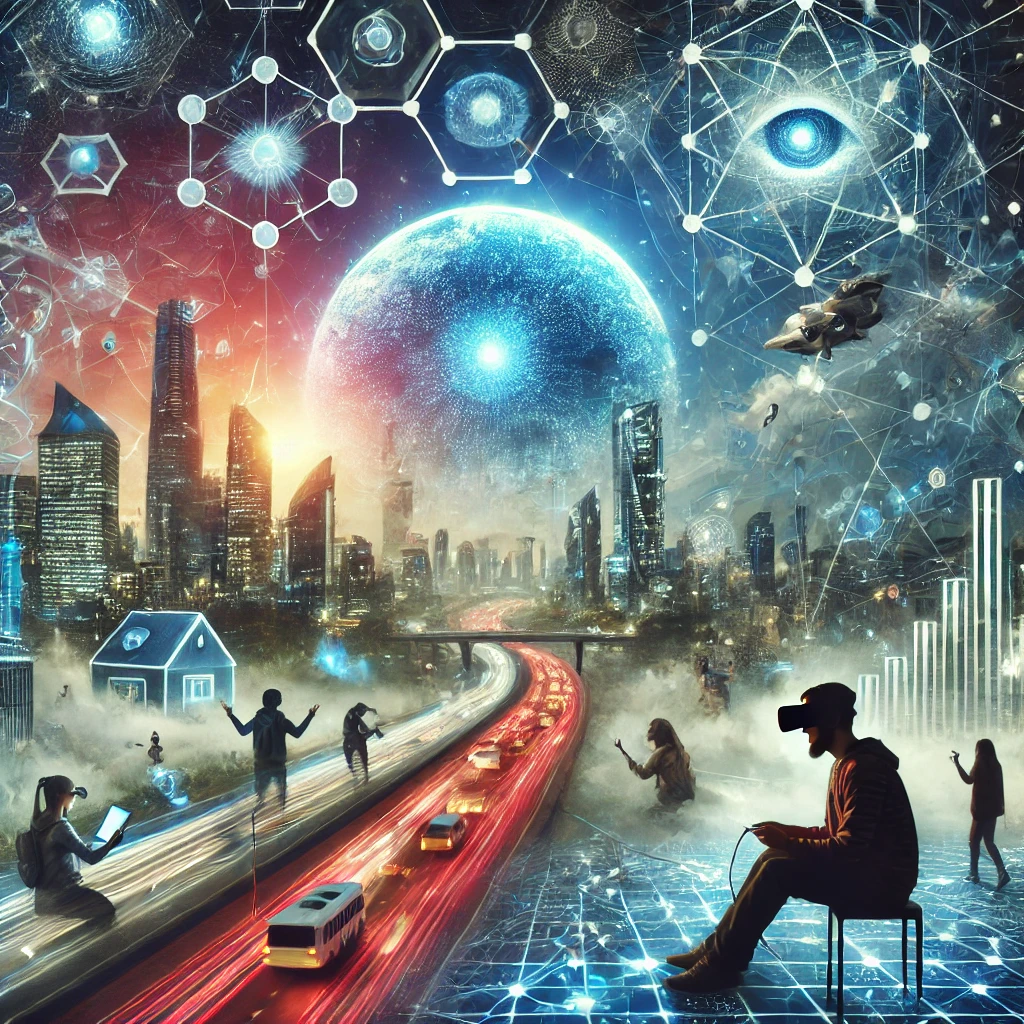The concept of the Metaverse has captivated technologists, gamers, and businesses alike. As we look ahead to the next decade, several key predictions emerge that will shape this virtual landscape.
1. Enhanced Interoperability
One of the most significant trends will be interoperability among different platforms. Currently, virtual worlds like Decentraland and Roblox operate in silos. However, as technological advancements occur, users will navigate seamlessly between various virtual environments using their cross-platform identities. Expect standards and protocols to evolve similar to how the World Wide Web functions today.
2. Rise of Virtual Economies
The Metaverse will give rise to complex virtual economies where digital goods and services flourish. Here are some key features to consider:
- Growth in Non-Fungible Tokens (NFTs) representing ownership of digital assets.
- Decentralized finance (DeFi) elements implemented within virtual worlds.
- Mainstream adoption of cryptocurrency for seamless transactions.
This economic framework will facilitate trade and stimulate user engagement across various platforms.
3. Integration of Augmented Reality (AR) and Virtual Reality (VR)
In the next decade, a significant trend will be the fusion of Augmented Reality (AR) and Virtual Reality (VR). Users can expect:
- Immersive experiences that blend the digital and physical worlds.
- The use of AR glasses for accessible metaverse interactions on-the-go.
- Real-time collaborative environments that enhance social and work interactions.
This integration will pave the way for novel applications in education, gaming, and remote work.
4. Privacy and Security Concerns
As the Metaverse expands, privacy and security will become critical issues. Users will demand transparency about data use and protection. Key trends to watch include:
- Decentralized identity solutions that give users control over their data.
- Enhanced encryption methods to secure transactions and personal information.
- Regulatory frameworks that govern privacy standards across the Metaverse.
Addressing these concerns will be essential to build user trust and encourage widespread adoption.
5. Evolution of Content Creation
The content creators of tomorrow will dominate the Metaverse. As we look to the future, we can anticipate:
- Advanced tools for creators that enable seamless content development.
- Platforms that provide monetization options without intermediary fees.
- Growth in user-generated content, empowering users to shape their virtual environments.
The democratization of content creation will be fundamental to the Metaverse’s success and diversity.
How Will Virtual Reality and Augmented Reality Shape the Metaverse by 2030?
The convergence of Virtual Reality (VR) and Augmented Reality (AR) technologies is poised to significantly redefine the concept of the metaverse by 2030. As immersive experiences take center stage, we can expect to see a paradigm shift in how users interact with digital environments, brands, and each other. The integration of these technologies will not only alter entertainment and gaming landscapes but also revolutionize sectors like education, healthcare, and remote work.
[aib_post_related url=’/metaverse-corporate-solutions/’ title=’Metaverse corporate solutions’ relatedtext=’Quizás también te interese:’]
What Role Will VR and AR Play in User Interaction?
By 2030, the user interaction within the metaverse will be primarily dictated by the capabilities offered by VR and AR. Here are some key developments anticipated:
- Enhanced Immersion: VR will provide fully immersive experiences where users can feel as if they are truly ‘present’ in a virtual world.
- Augmentation of Reality: AR will overlay digital information onto the real world, allowing for interactive experiences that blend physical and digital realms.
- Social Connectivity: Users will engage with each other in shared virtual spaces, with VR allowing for avatars and environments that mirror real-world interactions.
This shift will create more meaningful connections among users, fostering collaboration, and socialization in ways that transcend traditional digital interactions.
Which Industries Will Benefit the Most from These Technologies?
The application of VR and AR within the metaverse will transcend entertainment, impacting various industries:
- Education: Students will participate in virtual classrooms, experiencing immersive learning environments that enhance retention and understanding.
- Healthcare: Training simulations for medical professionals will use VR, while AR can assist in surgeries by providing real-time data overlays.
- Real Estate: Virtual property tours using VR will become commonplace, allowing buyers to explore properties without physical presence.
By 2030, these industries will have transformed their operational models through the adoption of VR and AR, leading to enhanced efficiency and user engagement.
What Technological Advancements Will Drive These Changes?
The evolution of the metaverse will be supported by several technological advancements:
- Increased Processing Power: More powerful processors and graphics cards will enable richer and more detailed VR experiences.
- 5G Connectivity: High-speed internet will reduce latency in VR and AR applications, facilitating smooth and responsive interactions.
- AI Integration: Artificial Intelligence will personalize user experiences, making interactions more intuitive and responsive.
These innovations will propel the ongoing development of the metaverse, making VR and AR indispensable tools for both users and creators alike.
The Role of Blockchain Technology in the Future of the Metaverse: Opportunities and Challenges
The emergence of the metaverse has generated excitement across various sectors, promising an immersive digital experience that integrates augmented reality (AR), virtual reality (VR), and blockchain technology. Blockchain plays a crucial role in this digital frontier by enhancing security, interoperability, and asset ownership. With the rise of digital currencies and assets, blockchain technology presents opportunities and challenges for the metaverse, making it essential to explore these dynamics.
Opportunities Offered by Blockchain in the Metaverse
Blockchain technology paves the way for numerous opportunities within the metaverse:
- Decentralized Ownership: Blockchain facilitates true ownership of digital assets. Each user can possess virtual items like real estate or collectibles, secured by smart contracts.
- Interoperability: Blockchain ensures seamless interaction across various platforms. Digital assets can move effortlessly between different virtual worlds.
- Enhanced Security: Encrypted and transparent transactions enhance trust among users, reducing the risk of fraud and hacks.
- Incentivized Participation: Users can earn tokens or coins for their contributions, fostering community engagement and a vibrant economy.
Challenges Facing Blockchain Integration in the Metaverse
Though the benefits are significant, integrating blockchain within the metaverse presents several challenges:
- Scalability: Current blockchain networks face scalability issues, which could hinder their ability to support large numbers of users and transactions.
- Energy Consumption: Many blockchain networks, especially those using proof-of-work, are energy-intensive, raising sustainability concerns.
- Regulatory Uncertainty: The evolving regulatory environment surrounding cryptocurrencies and digital assets can create hurdles for metaverse projects.
- User Experience: The complexity of blockchain technology may deter non-technical users from immersing themselves in the metaverse.
To unlock the full potential of the metaverse, addressing these challenges while capitalizing on the opportunities offered by blockchain is crucial. Both technology developers and users must work in harmony to create a seamless and enriching experience that leverages the strengths of blockchain, ensuring a resilient future for the metaverse.
How Businesses Can Prepare for the Metaverse Revolution: Strategies for the Next Decade
The Metaverse is no longer a concept restricted to science fiction; it is quickly becoming a reality. As businesses eye this emerging landscape, a robust strategy is crucial for leveraging opportunities it presents. Here, we delve into effective strategies that enterprises can adopt to navigate this transformative environment.
Understanding the Metaverse Landscape
Before diving into preparation strategies, it’s essential to grasp what the Metaverse encompasses. Essentially, it is a collective virtual space that merges physical and digital worlds, leveraging technologies such as virtual reality (VR), augmented reality (AR), and blockchain. Companies can take the following steps:
- Research and Development: Invest in R&D to explore VR and AR technologies that align with your business model.
- Stakeholder Engagement: Collaborate with tech firms and startups specializing in Metaverse creation and maintenance.
- Market Analysis: Conduct extensive market research to identify target demographics and their interests in virtual spaces.
Building Digital Infrastructure
A foundational step in preparing for the Metaverse is solidifying your digital infrastructure. Businesses need an adaptable technology framework to facilitate their transition. Key components include:
- Cloud Computing: Leverage cloud solutions to ensure seamless scalability and access to resources.
- Data Security: Implement robust cybersecurity measures to protect user data in the increasingly interconnected virtual environment.
- Interoperability: Choose platforms that support interoperability, allowing users to interact between different virtual realms.
Engaging Users in New Ways
Creating engaging experiences in the Metaverse demands innovative approaches. Businesses should focus on:
- Immersive Marketing: Develop campaigns that utilize AR and VR to create rich, interactive experiences for users.
- Community Building: Foster communities within the Metaverse by hosting virtual events, workshops, and forums.
- User-Centric Design: Prioritize user experience (UX) by designing intuitive interfaces that make navigation easy in virtual environments.
[aib_post_related url=’/metaverse-virtual-corporate-meetings/’ title=’Metaverse virtual corporate meetings’ relatedtext=’Quizás también te interese:’]
Integrating Blockchain and Cryptocurrencies
As digital transactions become more prevalent in the Metaverse, understanding blockchain technology is vital. Businesses should consider:
- Smart Contracts: Utilize smart contracts to automate transactions and improve trust with customers.
- Digital Currency Adoption: Explore options for integrating cryptocurrencies into your payment systems.
- Tokenization of Assets: Investigate how to represent assets as digital tokens, providing new ways to trade and invest in virtual goods.
By systematically embracing these strategies, businesses can proficiently position themselves at the forefront of the Metaverse revolution, optimizing their growth potential for the next decade.
[aib_post_related url=’/integracion-del-metaverso-en-la-ensenanza-2/’ title=’Integración del Metaverso en la enseñanza’ relatedtext=’Quizás también te interese:’]
Impact of the Metaverse on Social Interactions and Digital Communities in the 2030s
The Metaverse has emerged as a revolutionary space set to redefine how we engage socially and form digital communities. By the 2030s, it is anticipated that the immersive nature of the Metaverse will significantly impact the dynamics of human interactions. People are likely to leverage virtual environments for everything from casual conversations to professional networking, paving the way for enhanced social experiences.
Transformative Social Interactions
In the 2030s, the Metaverse will widely influence social interactions by:
- Creating Immersive Experiences: Utilizing technologies such as virtual reality (VR) and augmented reality (AR), users will interact in three-dimensional settings. This will not only make conversations more engaging but also allow individuals to share experiences in real-time, transcending geographical boundaries.
- Fostering Inclusivity: The Metaverse will create spaces that cater to diverse communities, offering platforms for underrepresented groups to connect and collaborate. This will foster a sense of belonging that transcends physical limitations.
- Enhancing Emotional Connections: Through avatars representing users in the Metaverse, emotional expressions can be more accurately conveyed. This will help in forming deeper emotional bonds than traditional texting or video calls.
Evolving Digital Communities
As the Metaverse expands, so will the nature of digital communities. By the end of the decade, we anticipate growth in:
- Niche Communities: The Metaverse will facilitate the formation of specialized communities where individuals with shared interests can gather. This could range from gaming clans to professional groups focused on specific industries.
- Decentralized Governance: Communities may adopt decentralized decision-making structures utilizing blockchain technology, allowing members to actively engage in maintaining rules and standards within their virtual spaces.
- Enhanced Collaboration Tools: The integration of advanced collaboration applications will enable users to work together seamlessly on projects, fostering a spirit of teamwork and innovation.
As new social norms and digital ecosystems evolve, the Metaverse will serve as a catalyst, shaping how we interact and connect with one another in the 2030s. Its impact will likely challenge our conventional views of community and engagement, paving the way for new forms of social participation.


